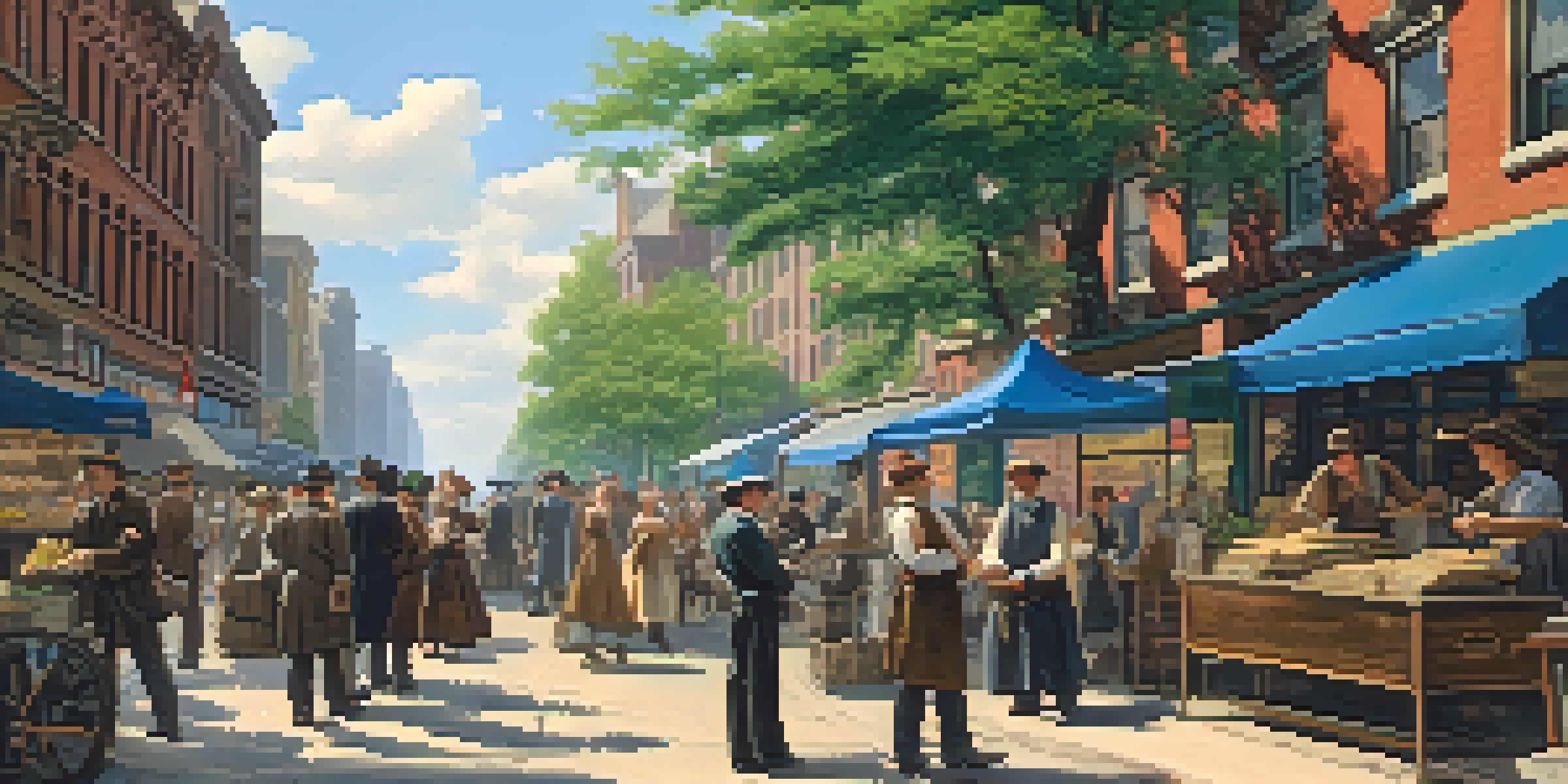The Life and Influence of Walt Whitman in New York City

Walt Whitman's Early Life in New York City
Walt Whitman was born on May 31, 1819, on Long Island, but it was New York City that shaped his creative spirit. Moving to Manhattan as a young man, he was immersed in the vibrant culture and diversity that the city offered. This dynamic environment became a backdrop for his literary pursuits and inspired much of his work. Whitman's early experiences in the city, including his time as a teacher and journalist, laid the groundwork for his revolutionary ideas about poetry.
I believe a leaf of grass is no less than the journey-work of the stars.
Living in the bustling streets of New York, Whitman witnessed the struggles and triumphs of everyday people. He worked various jobs, including as a printer and a journalist, which allowed him to connect with different communities. These interactions fueled his passion for democracy and the human experience, themes that would later permeate his poetry. This blend of personal experience and urban life became the heartbeat of his writing.
The city's influence on Whitman was profound, as he began to envision a poetry that celebrated individuality and the collective human spirit. His encounters with immigrants, workers, and artists shaped his understanding of America as a diverse tapestry of voices. These formative years in New York were crucial in molding Whitman into the poetic innovator we recognize today.
The Release of 'Leaves of Grass' in Brooklyn
'Leaves of Grass,' Whitman's groundbreaking collection of poetry, was first published in 1855 in Brooklyn. This work was revolutionary, breaking away from traditional poetic forms and embracing free verse. Whitman's bold exploration of themes like nature, sexuality, and the self challenged societal norms of the time. The book was not widely accepted initially, but it captured the essence of Whitman's vision for American poetry.

The Brooklyn landscape, with its parks and waterfronts, served as both inspiration and refuge for Whitman as he penned his verses. The city itself became a character in his poetry, reflecting the beauty and complexity of urban life. In 'Leaves of Grass,' Whitman wrote with a deep sense of connection to the city and its inhabitants, celebrating their struggles and joys. This collection marked a significant turning point in American literature, paving the way for future poets.
Whitman's NYC Roots Shaped His Poetry
Walt Whitman's early life in New York City profoundly influenced his revolutionary ideas about individuality and the human experience in his poetry.
Despite facing criticism, Whitman's unwavering commitment to his work led him to revise and expand 'Leaves of Grass' throughout his life. The collection eventually gained recognition and acclaim, becoming a cornerstone of American literature. Whitman's willingness to embrace his true self and advocate for others through his poetry resonated with many, solidifying his legacy in the literary world.
Whitman's Connection to the Civil War
The Civil War profoundly impacted Walt Whitman, prompting him to take on a new role as a volunteer nurse in New York City. Witnessing the devastation firsthand, he documented the experiences of soldiers and their families, blending compassion with a fierce sense of patriotism. His work during this tumultuous period deepened his understanding of humanity and suffering, elements that would permeate his later writings.
The powerful play goes on, and you may contribute a verse.
Whitman's experiences in hospitals and battlefields inspired a series of poignant poems that reflected his emotional turmoil. In his work, he honored the sacrifices made by soldiers and captured the raw essence of their experiences. His poem 'Drum-Taps' emerged from this period, offering a heartfelt tribute to the courage and resilience of those who fought. This collection illustrated his belief in the interconnectedness of all people, a central theme in his poetry.
The war also fueled Whitman's advocacy for social justice and equality. He became increasingly vocal about issues such as abolition and workers' rights, using his platform to champion the marginalized. His unwavering commitment to the ideals of democracy and freedom made him a significant literary figure during and after the Civil War, influencing generations of writers and activists.
Walt Whitman's Literary Style and Innovations
Walt Whitman's literary style was revolutionary, characterized by free verse that broke away from traditional meter and rhyme. This approach allowed him to express his thoughts and emotions more authentically, capturing the rhythm of speech. His innovative use of language and form opened the door for future poets to experiment with their writing. Whitman's verses flowed like a conversation, inviting readers into his world with warmth and familiarity.
One of Whitman's notable techniques was his use of cataloging, where he listed people, objects, and experiences to create a sense of abundance and diversity. This method not only celebrated the richness of life but also reflected the bustling energy of New York City itself. By weaving together various voices and perspectives, Whitman painted a vivid picture of American life, embracing its complexity and contradictions.
'Leaves of Grass' Redefined Poetry
'Leaves of Grass' marked a significant turning point in American literature, embracing free verse and themes of nature, sexuality, and self, despite initial criticism.
His bold exploration of themes such as identity, nature, and the human experience resonated deeply with readers. Whitman's ability to connect with his audience on an emotional level transformed the way poetry was perceived. His work encouraged individuals to embrace their true selves, fostering a sense of unity and shared humanity that continues to inspire writers and readers alike.
Whitman's Influence on New York City Culture
Walt Whitman's impact on New York City culture is undeniable, as he became a symbol of artistic freedom and self-expression. His poetry resonated with the city's diverse population, reflecting their struggles and aspirations. As a champion of democracy, Whitman's work inspired not only writers but also social reformers and activists who sought to create a more inclusive society. His legacy continues to shape the cultural landscape of the city.
Whitman's love for New York was evident in his poetry, where he celebrated the city's landmarks, parks, and people. He often roamed the streets, absorbing the sights and sounds that fueled his creativity. This deep connection to the city fostered a sense of belonging among its inhabitants, encouraging them to embrace their unique identities. Whitman's celebration of the urban experience laid the foundation for future literary movements, including the Beat Generation and modernist poetry.
The annual Walt Whitman Birthday Celebration in Brooklyn serves as a testament to his enduring influence. This event brings together poets, artists, and fans to honor his legacy and explore the themes of his work. Through festivals, readings, and educational programs, Whitman's spirit lives on, inspiring new generations to engage with literature and art in meaningful ways.
Walt Whitman's Final Years in Camden
In the later years of his life, Walt Whitman moved to Camden, New Jersey, but New York City remained an integral part of his identity. Despite the physical distance, the city continued to inspire his work and thoughts. Whitman's health declined, but he remained active in literary circles, corresponding with fellow writers and engaging in discussions about art and society. His connection to New York never waned, as he often reminisced about the vibrant life he once experienced there.
During this time, Whitman focused on revising and expanding 'Leaves of Grass,' solidifying his status as a literary icon. He embraced the notion of aging with grace, reflecting on his life and the legacy he would leave behind. His final editions of the collection showcased his growth as a poet and thinker, revealing a deeper understanding of life and love. Whitman's unwavering passion for his craft remained evident until the end.
Whitman's Legacy Influences Culture
Walt Whitman's enduring legacy continues to inspire artists and activists, reflecting his commitment to democracy, social justice, and the celebration of diverse human experiences.
Whitman's passing on March 26, 1892, marked the end of an era, but his influence endured. The themes of connection, individuality, and the human experience that he championed continue to resonate in literature and beyond. His legacy lives on in New York City, where his spirit is celebrated through art, education, and the ongoing exploration of identity and freedom.
Walt Whitman's Enduring Legacy in Literature
Walt Whitman's legacy in literature is profound, as he reshaped the landscape of American poetry. His innovative approach to form and content inspired countless poets who followed in his footsteps, allowing for greater freedom of expression. Whitman's emphasis on individuality and the universality of human experience laid the groundwork for modern poetry, inviting writers to explore new themes and styles. His work encourages a deeper understanding of what it means to be human, transcending time and place.
The themes of self-discovery and connection found in Whitman's poetry continue to resonate with readers today. His ability to articulate the complexities of life and the beauty of the human spirit invites us to reflect on our own experiences. Whitman's work remains relevant in contemporary discussions about identity, community, and social justice, encouraging a dialogue that spans generations. His fearless exploration of taboo subjects, such as sexuality and spirituality, paved the way for open discussions in literature.

Ultimately, Whitman's influence extends beyond the realm of poetry; he has become a symbol of artistic freedom and self-expression. His commitment to celebrating diversity and embracing the human experience inspires artists, writers, and activists to this day. As we navigate the complexities of modern life, Whitman's words remind us of the power of literature to connect us and foster understanding across cultures and communities.